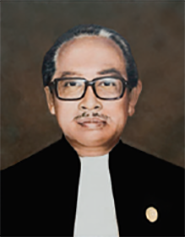
The politics of Indonesia take place in the framework of a presidential representative democratic republic whereby the President of Indonesia is both head of state and head of government and of a multi-party system. Executive power is exercised by the government. Legislative power is vested in both the government and the bicameral People's Consultative Assembly. The judiciary is independent of the executive and the legislature.

The Chief Justice of India is the head of the Supreme Court of India as well as the highest-ranking group 'A' gazetted officer of the Indian Judiciary. The Constitution of India grants power to the president of India to appoint, in consultation with the outgoing chief justice, the next chief justice, who will serve until they reach the age of sixty-five or on completion of three years, whichever is earlier. Chief Justice of India can be impeached from service by the President of India on advice of the Parliament of India. As per convention, the name suggested by the incumbent chief justice is almost always the next senior most judge in the Supreme Court.

The term Government of the Republic of Indonesia can have a number of different meanings. At its widest, it can refer collectively to the three traditional branches of government – the executive branch, legislative branch and judicial branch. The term is also used colloquially to mean the executive and legislature together, as these are the branches of government responsible for day-to-day governance of the nation and lawmaking. At its narrowest, the term is used to refer to the executive branch in form of the Cabinet of Indonesia as this is the branch of government responsible for day-to-day governance.

The 1945 State Constitution of the Republic of Indonesia is the supreme law and basis for all laws of Indonesia.
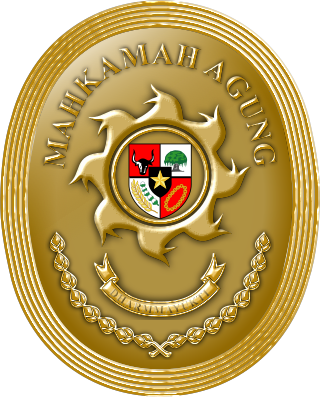
The Supreme Court of the Republic of Indonesia is the independent judicial arm of the state. It maintains a system of courts and sits above the other courts and is the final court of appeal. It can also re-examine cases if new evidence emerges.

The president of the Republic of Indonesia is both the head of state and the head of government of the Republic of Indonesia. The president leads the executive branch of the Indonesian government and is the commander-in-chief of the Indonesian National Armed Forces. Since 2004, the president and vice president are directly elected to a five-year term, once renewable, allowing for a maximum of 10 years in office.

The Presidential Cabinet was the first cabinet established by Indonesia following the 17 August 1945 Indonesian Declaration of Independence. It comprised 20 ministers and four officials. Its term of office ran from 2 September to 14 November 1945.

The Constitutional Court of the Republic of Indonesia is one of the apex courts in Indonesia along with the Indonesian Supreme Court. Its primary role is reviewing the constitutionality of statutes (undang-undang). It also has other functions, including resolving disputes over the powers of state institutions, settling disputes over the results of general elections, deciding on the dissolution of political parties, and supervising impeachment. The last two functions have never been exercised by the Court.

The Judicial Commission of Indonesia was established as a consequence of the third amendment to the Constitution of Indonesia ratified by the Indonesian People's Consultative Assembly on 9 November 2001. The Commission's duty is to monitor the performance of judges, advise the House of Representatives on judicial appointments and review community complaints about the behavior and fairness of presiding judges.
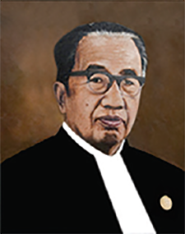
Wirjono Prodjodikoro was the head justice of the Indonesian Supreme Court from 1952 to 1966.

Dr. Sahardjo LL.B., was a National Hero and Minister of Justice of Indonesia during the First, Second, and Third Working Cabinets.

Sulaiman Effendi Kusumah Atmaja was an Indonesian judge and national hero who served as the first chief justice of the Supreme Court of Indonesia from August 1945 until August 1952. He was born to a noble ethnic-Sundanese family in Purwakarta, and obtained a law diploma from the Rechtschool in 1913. In 1919, he worked as a court clerk in Bandung, before leaving that job to continue his legal education at Leiden University. After graduating from Leiden in 1922, he returned to the East Indies, and became a judge in Batavia and later Indramayu.

Adnan Buyung Nasution, also known as Adnan Bahrum Nasution was an Indonesian lawyer, advocate, and activist.
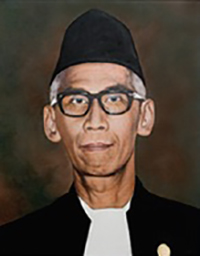
Suryadi was a former Chief Justice of the Supreme Court of Indonesia, as well as the first chairman of the Indonesian Judges Association.

Mujono (1927–1984) was the sixth Chief Justice of the Supreme Court of Indonesia as well as the 16th Minister of Law and Human Rights. His appointment to both posts began a line of former military officials predominating in Indonesia's legal system.
The Indonesian Judges Association, known locally as Ikatan Hakim Indonesia or IKAHI is an association of judicial officials in Indonesia. IKAHI's members include first-level trial judges and senior justices, as opposed to the Indonesian Judges' Forum (FDHI) which includes appeals court judges. IKAHI executive Suhadi has described the association's focus as protection of judges from threats and harassment, though judicial transparency activists have disputed this.

Purwoto Gandasubrata was the eighth Chief Justice of the Supreme Court of Indonesia. Alongside the Ministry of Justice officials in the Sixth Development Cabinet, Gandasubrata was a part of a general return of civilian officials to the judiciary of Indonesia in the early 1990s after a period of former military officials dominating the branch from the late 1970s. Gandasubrata had initially served as the chief of the district court of Semarang, as well as the chairman of the regional branch of the Indonesian Judges Association.

Suryono, also spelled Soerjono, was the ninth Chief Justice of the Supreme Court of Indonesia. The reputation of the Supreme Court among legal scholars suffered under his tenure due to Suryono's tendency to reverse seemingly final decisions via what were derisively termed "magic memos," and he was generally regarded as a candidate who would maintain the Supreme Court's subordination to the executive branch. He overturned an administrative court ruling that had lifted a New Order-era ban on Tempo, a popular political commentary magazine.
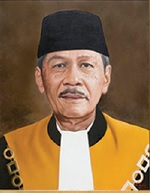
Sarwata was the tenth Chief Justice of the Supreme Court of Indonesia. Sarwata led an investigation by the Supreme Court into allegations of its own wrongdoing in 1996, during which his panel found no evidence of such wrongdoing. His promotion as Chief Justice thereafter was seen as a victory for the Court's old elite. He was the first Chief Justice of Indonesia to be openly accused of corruption.

Adi Andojo Soetjipto was an Indonesian jurist and lecturer who served as an associate justice of the Supreme Court of Indonesia from 1981 until his retirement in 1997. Soetjipto was nominated twice for the position by the People's Representative Council in 1979 and 1980 and was installed in 1981. He was known for exposing bribery and collusion inside the Supreme Court and his criticism of the Supreme Court.
